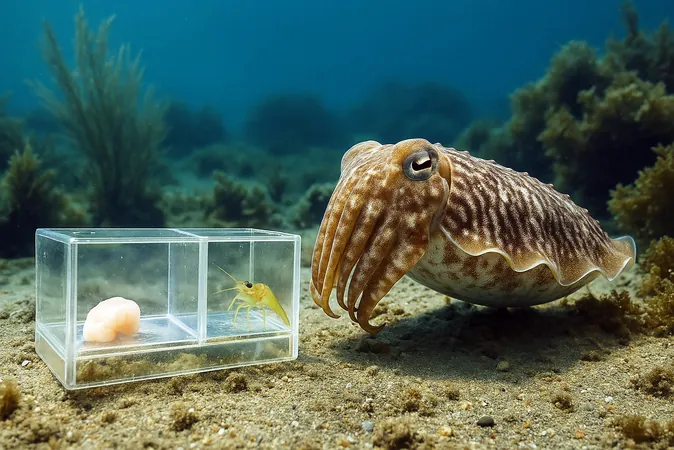
Cuttlefish Shock Scientists with Their Surprising Marshmallow Test Success!
2025-05-26
Author: Lok
Waiting can be tough—whether it’s a child eyeing a cookie or a cuttlefish anxiously lurking near a crab. This struggle between instant gratification and patience is not just human; it shapes decision-making across species.
The Cuttlefish’s Stunning Revelation
While researchers have long explored self-control in humans and primates, evidence in other animals has been scarce. But a groundbreaking study has just spotlighted cuttlefish in a version of the infamous “marshmallow test,” where they demonstrated remarkable patience and intelligence.
How the Marshmallow Test Works Underwater
In the original marshmallow test, preschoolers choose between one marshmallow immediately or two if they wait. The researchers adapted this underwater by offering hungry cuttlefish a piece of shrimp right away or a live grass shrimp behind a barrier.
Some cuttlefish immediately grabbed the ordinary shrimp, while others displayed incredible restraint, hovering for over two minutes to snag the superior treat when it became available. Wait times varied between 50 to 130 seconds, comparable to that of some intelligent birds, despite the cuttlefish's shorter lifespan.
A Closer Look at Their Performance
Lead researcher Alexandra Schnell from the University of Cambridge, along with her team, found that cuttlefish that excelled in waiting also demonstrated superior learning ability. Once trained to associate colors with food, those who adapted quickest were also the ones who successfully practiced self-control.
Why Cuttlefish Wait: A Survival Strategy
Cuttlefish spend much of their time camouflaged, waiting for the perfect moment to forage. Each time they expose themselves to hunt for food, they risk becoming prey themselves. This behavior suggests that their knack for delaying gratification may be an evolutionary strategy to enhance foraging efficiency while minimizing danger.
A New Perspective on Intelligence
While octopuses and squids often steal the spotlight for their intelligence, the findings about cuttlefish reveal that complex behaviors can emerge in different nervous systems. This shared adaptability hints that self-control is not merely a human trait but a foundational strategy that has evolved across millions of years in the animal kingdom.
The study, published in the Proceedings of the Royal Society B, redefines our understanding of cognition in invertebrates and raises intriguing questions about the evolution of intelligence.
This new insight into cuttlefish intelligence reminds us that remarkable capabilities can be lurking in the most unexpected places!

 Brasil (PT)
Brasil (PT)
 Canada (EN)
Canada (EN)
 Chile (ES)
Chile (ES)
 Česko (CS)
Česko (CS)
 대한민국 (KO)
대한민국 (KO)
 España (ES)
España (ES)
 France (FR)
France (FR)
 Hong Kong (EN)
Hong Kong (EN)
 Italia (IT)
Italia (IT)
 日本 (JA)
日本 (JA)
 Magyarország (HU)
Magyarország (HU)
 Norge (NO)
Norge (NO)
 Polska (PL)
Polska (PL)
 Schweiz (DE)
Schweiz (DE)
 Singapore (EN)
Singapore (EN)
 Sverige (SV)
Sverige (SV)
 Suomi (FI)
Suomi (FI)
 Türkiye (TR)
Türkiye (TR)
 الإمارات العربية المتحدة (AR)
الإمارات العربية المتحدة (AR)